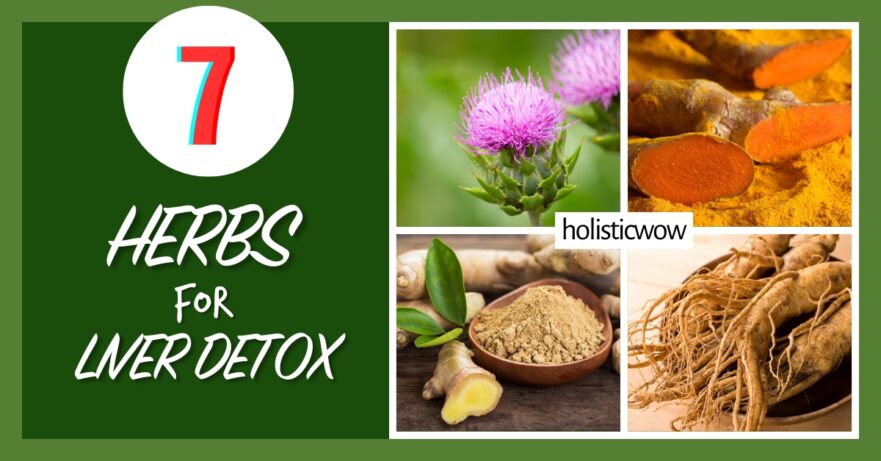In this article about herbs for liver:
🌿 Best Herbs for Liver | 📜 Herbal Preparations and Recipes for Liver Health | ☯️ Integrating Herbs into Daily Life for Liver Health | 🌱 Navigating Herbs Safely
The liver plays a crucial role in detoxification, metabolism, and overall health. When liver function is compromised, it can lead to fatigue, digestive issues, and more serious conditions like fatty liver disease or cirrhosis. These problems can stem from various factors, including poor diet, alcohol consumption, and environmental toxins.
Certain herbs have shown promise in supporting liver health. Milk thistle, turmeric, and dandelion root are natural remedies that may help protect liver cells, reduce inflammation, and enhance the organ’s detoxification processes. These herbs offer potential benefits for those seeking to improve their liver function.
Understanding how these herbs work and how to use them safely is crucial. The following sections will explore each herb’s specific benefits, proper usage, and potential side effects to help you make informed decisions about incorporating them into your liver health regimen.
Key Takeaways
- 🌿 Powerful Liver Herbs: Herbs like milk thistle, turmeric, and dandelion root are known for their potential to protect and support liver health.
- 🍵 Lifestyle Integration Tips: For consistent benefits, incorporate liver-supporting herbs into your daily routine through teas, cooking, or supplements.
- 💚 Holistic Liver Care: Combine herbal remedies with a healthy diet, regular exercise, and limit alcohol intake if you drink for optimal liver health.
🌿 Best Herbs for Liver
The liver plays a crucial role in our body’s detoxification processes, metabolism, and overall health. When liver function is compromised, it can lead to various symptoms and health issues. Common signs of liver problems include fatigue, abdominal pain, nausea, jaundice (yellowing of skin and eyes), and dark urine. In more advanced stages, symptoms may involve easy bruising, swelling in the legs and ankles, and confusion, often associated with liver cirrhosis or liver failure.
Liver issues can stem from various causes, including excessive alcohol consumption, viral infections, obesity, and certain medications. Fatty liver disease, both alcoholic and non-alcoholic, is becoming increasingly common in the United States and globally.
Nature offers a range of herbs that have been traditionally used to support liver health and function. These include milk thistle (Silybum marianum), turmeric (Curcuma longa), ginger (Zingiber officinale), ginseng (Panax ginseng), burdock (Arctium lappa), dandelion root (Taraxacum officinale), and artichoke (Cynara scolymus) are believed to promote liver wellness by supporting the body’s natural detoxification processes. These herbs have unique properties that may contribute to liver wellness and support the body’s natural detoxification processes.
Milk thistle (Silybum marianum)
Milk thistle (Silybum marianum) has been used for centuries to support liver health, particularly in European herbal medicine. The active compound, silymarin, is believed to protect liver cells from toxins and free radicals [1]. It may also stimulate liver cell regeneration and reduce inflammation [2]. Additionally, silymarin has been shown to act as an antioxidant, helping to protect the liver from damage, especially in conditions like nonalcoholic fatty liver disease (NAFLD) [3]. Milk thistle is commonly used to support liver function in conditions like cirrhosis, hepatitis, and fatty liver disease. Silymarin may also help improve insulin resistance, a common issue linked to liver problems like NAFLD [4]. While promising, milk thistle should complement, not replace, standard treatments. It may help protect the liver from damage caused by alcohol, medications, and environmental toxins.
Turmeric (Curcuma longa)
Turmeric (Curcuma longa) has been used for thousands of years in traditional medicine to support liver health. The active compound, curcumin, is known for its anti-inflammatory and antioxidant properties, which may help protect liver cells from damage and reduce inflammation [5]. Curcumin may also prevent fat accumulation in the liver, making it potentially useful for non-alcoholic fatty liver disease (NAFLD) [6]. Some studies suggest curcumin stimulates bile production, aiding fat digestion and indirectly benefiting liver health. Additionally, curcumin may have other benefits, such as reducing waist circumference and total glycerides [7]. Since curcumin has low bioavailability, pairing it with black pepper or specialized formulations can enhance absorption. Incorporating turmeric into your diet or taking curcumin supplements may help support liver function and protect against liver damage.
Ginger (Zingiber officinale)
Ginger (Zingiber officinale) has been used in traditional medicine for centuries, particularly in Asian cultures, for its potential liver benefits. Ginger contains compounds with antioxidant and anti-inflammatory properties that may help protect the liver from damage caused by oxidative stress and inflammation. Some studies suggest ginger might reduce liver inflammation and improve liver enzyme levels in people with non-alcoholic fatty liver disease (NAFLD) [8] [9]. However, more research is needed to confirm these effects. Ginger may also help with bile production, aiding fat digestion and supporting liver function. While ginger is generally safe, high doses can interact with medications like blood thinners. Adding ginger to your diet or taking supplements could support liver health, but it shouldn’t replace medical treatments.
Ginseng (Panax ginseng)
Ginseng (Panax ginseng) has been used in traditional Chinese medicine for thousands of years and may support liver health. The key compounds, ginsenosides, have antioxidant and anti-inflammatory effects that might protect liver cells from damage and reduce inflammation. Some studies suggest ginseng could improve liver function in chronic liver diseases like cirrhosis and hepatitis, but more research is needed [10]. Ginseng may also help reduce fat buildup in the liver, which is beneficial for conditions like non-alcoholic fatty liver disease (NAFLD) [11]. While ginseng shows promise in protecting the liver from damage caused by alcohol and certain medications, most of this evidence comes from animal studies, so more human research is needed. Adding ginseng to your routine may help support liver health, but it’s not a substitute for medical treatment.
Burdock (Arctium lappa)
Burdock (Arctium lappa) has been used in traditional medicine for centuries, particularly in Chinese and European herbalism, for its potential liver benefits. Burdock root contains compounds like arctiin and arctigenin, which have shown potential in preclinical studies to help protect liver cells and reduce inflammation. However, more research is needed to confirm these effects in humans. Some animal studies suggest that burdock might improve liver function and lower liver enzyme levels, but human evidence is still limited, and more research is needed. Burdock is also known for its diuretic properties, helping the body eliminate toxins through urine. Additionally, burdock contains inulin, a fiber that supports gut health and is closely linked to liver function. While generally safe, burdock may interact with medications like blood thinners and diuretics.
Dandelion root (Taraxacum officinale)
Dandelion root (Taraxacum officinale) has been used in traditional medicine for its potential liver benefits. It contains polyphenols with antioxidant properties that may help protect liver cells from damage, though most of this evidence comes from lab studies. Dandelion root is also known to stimulate bile production, which aids digestion and supports liver function. Some preliminary studies suggest that dandelion root might help reduce liver inflammation and improve liver enzyme levels, but more human research is needed to confirm these effects. As a natural diuretic, dandelion root can help the body detox by increasing urine production. It also contains inulin, a prebiotic fiber that supports gut health which is closely linked to liver function. While dandelion is generally safe, it may interact with medications like diuretics and blood thinners. Adding dandelion root tea or supplements to your routine may support liver health, but it shouldn’t replace medical treatments.
Artichoke (Cynara scolymus)
Artichoke (Cynara scolymus) has been used in Mediterranean medicine for its potential liver benefits. Artichoke contains compounds like cynarin, which can potentially protect liver cells and reduce liver enzyme levels, supporting liver function [12]. Studies suggest that artichoke leaf extract may improve liver function, reduce symptoms in people with non-alcoholic fatty liver disease (NAFLD) [13], and help lower liver fat, though more research is needed [14]. Artichoke is also known for promoting bile flow and lowering cholesterol, which can support liver health. Its antioxidant properties may help protect the liver from damage. While generally safe, artichoke can cause digestive side effects in some people and may interact with certain medications, especially those affecting liver enzymes. Adding artichoke to your diet or taking supplements might support liver health, but it shouldn’t replace medical treatments.
📜 Herbal Preparations and Recipes for Liver Health
These herbal tea blends are crafted to support liver health naturally. Each recipe combines herbs traditionally known for their potential to assist in liver function and detoxification. Begin with the gentler blends and progress to the more potent ones as needed.
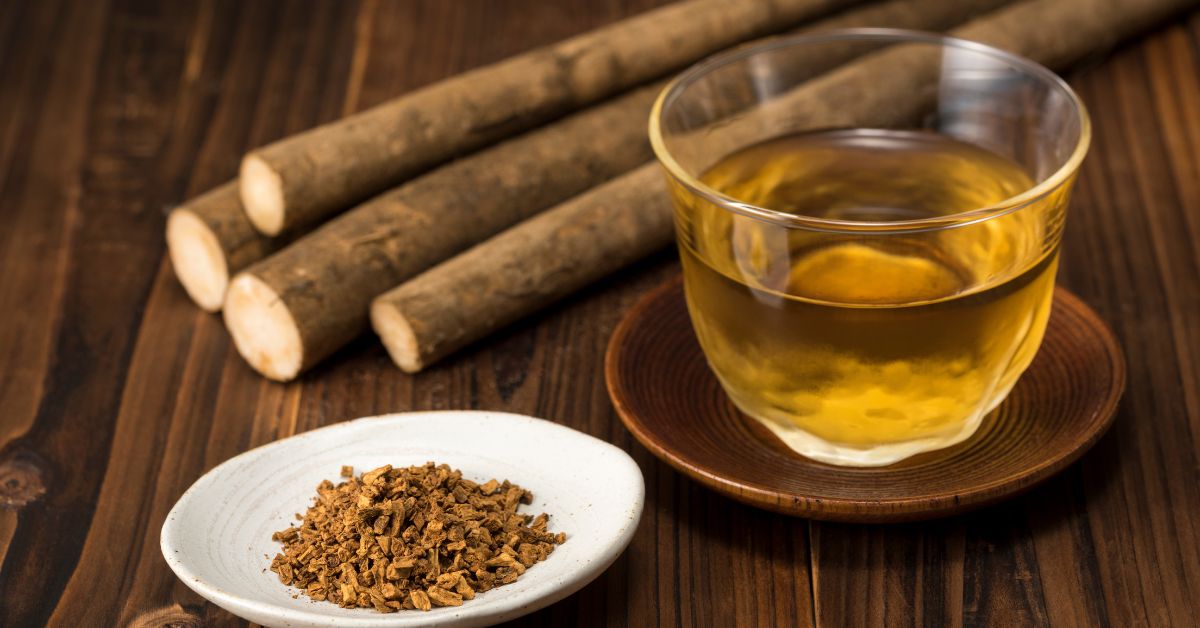
Gentle Liver Support Tea
Ingredients:
- 1 teaspoon dried dandelion root
- 1 teaspoon dried burdock root
- ½ teaspoon dried ginger root
- 1 cup of boiling water
Preparation:
- Combine herbs in a teapot.
- Add boiling water and steep for 15 minutes.
- Strain and drink one cup daily, preferably in the morning.
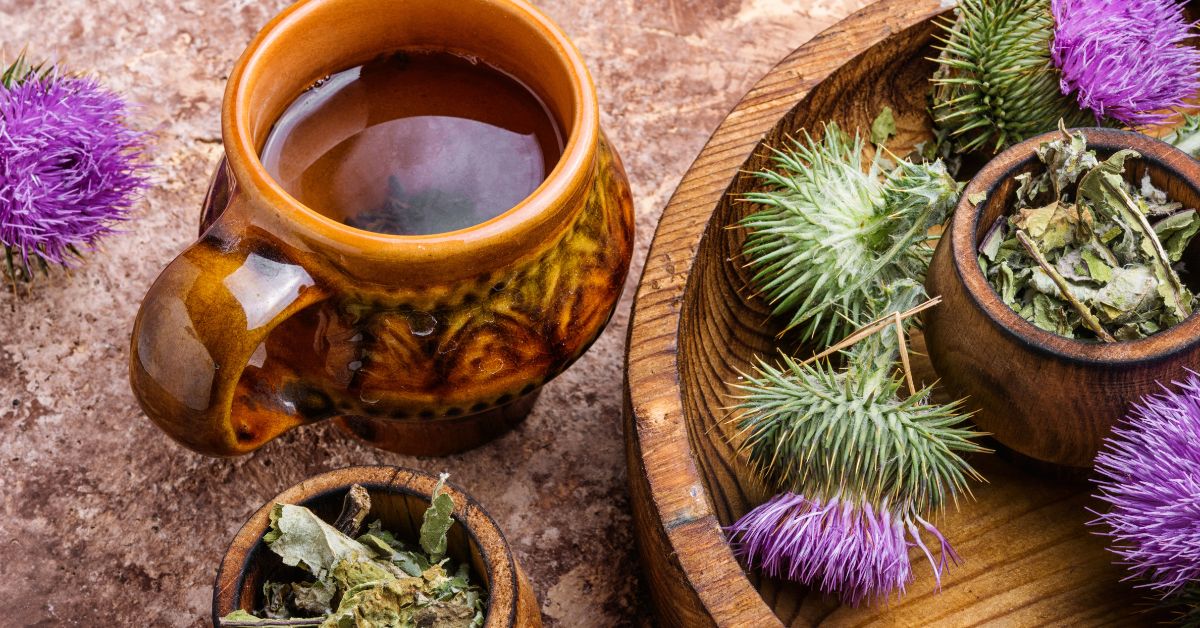
Liver Cleanse Infusion
Ingredients:
- 1 teaspoon dried milk thistle seeds
- ½ teaspoon dried dandelion root
- ½ teaspoon dried artichoke leaf
- 1 cup of boiling water
Preparation:
- Mix herbs in a teapot.
- Pour boiling water over herbs and steep for 10-12 minutes.
- Strain and drink one cup twice daily.
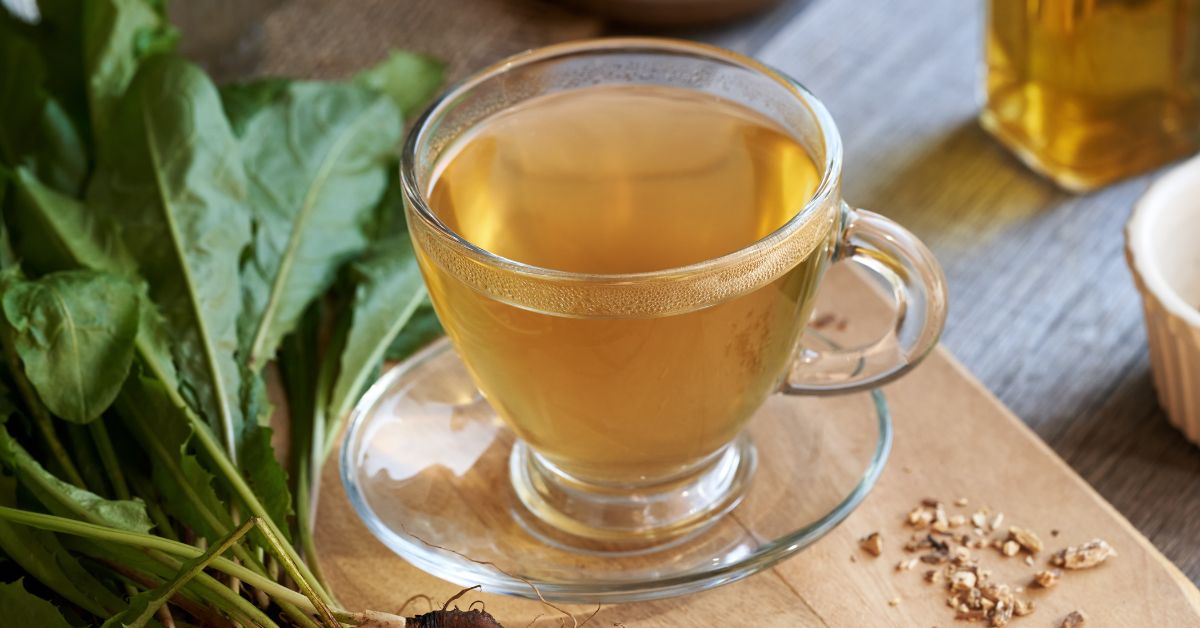
Hepatic Tonic Blend
Ingredients:
- 1 teaspoon dried milk thistle seeds
- ½ teaspoon dried dandelion root
- ½ teaspoon dried ginger root
- ½ teaspoon dried turmeric root
- 1 cup of boiling water
Preparation:
- Combine all herbs in a teapot.
- Add boiling water and steep for 15 minutes.
- Strain and drink one cup in the morning and evening.
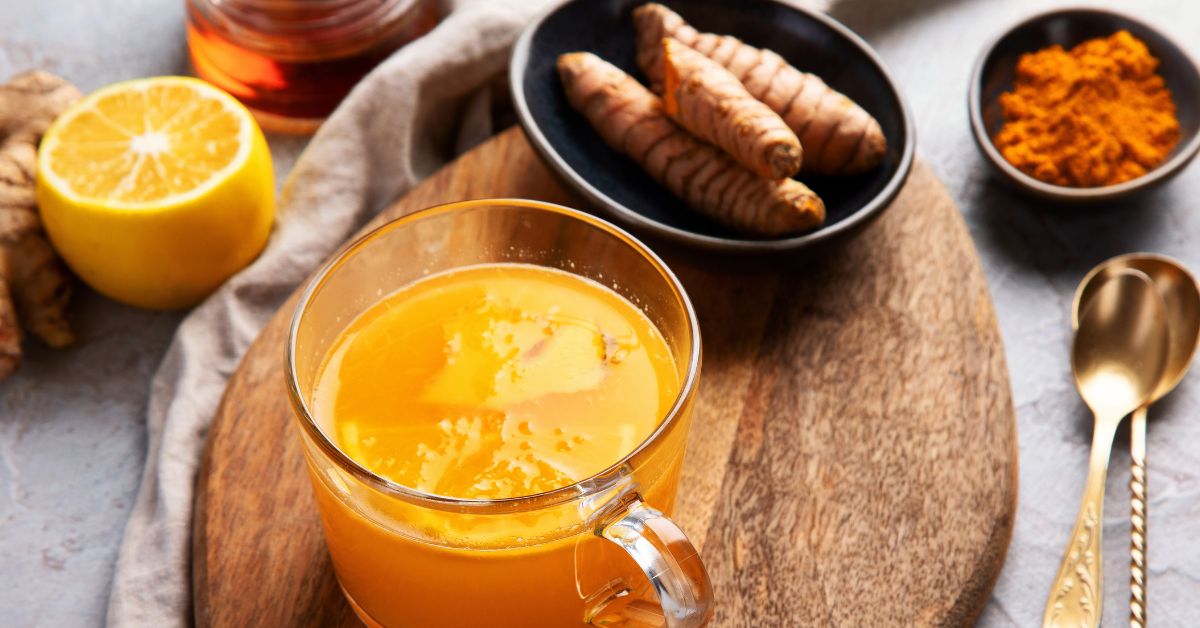
Liver Detox Decoction
Ingredients:
- 1 teaspoon dried milk thistle seeds
- ½ teaspoon dried burdock root
- ½ teaspoon dried dandelion root
- ½ teaspoon dried turmeric root
- ½ teaspoon dried ginger root
- 2 cups of water
Preparation:
- Add herbs to cold water in a small pot.
- Bring to a boil, reduce heat, and simmer for 15-20 minutes.
- Strain and drink one cup twice daily.
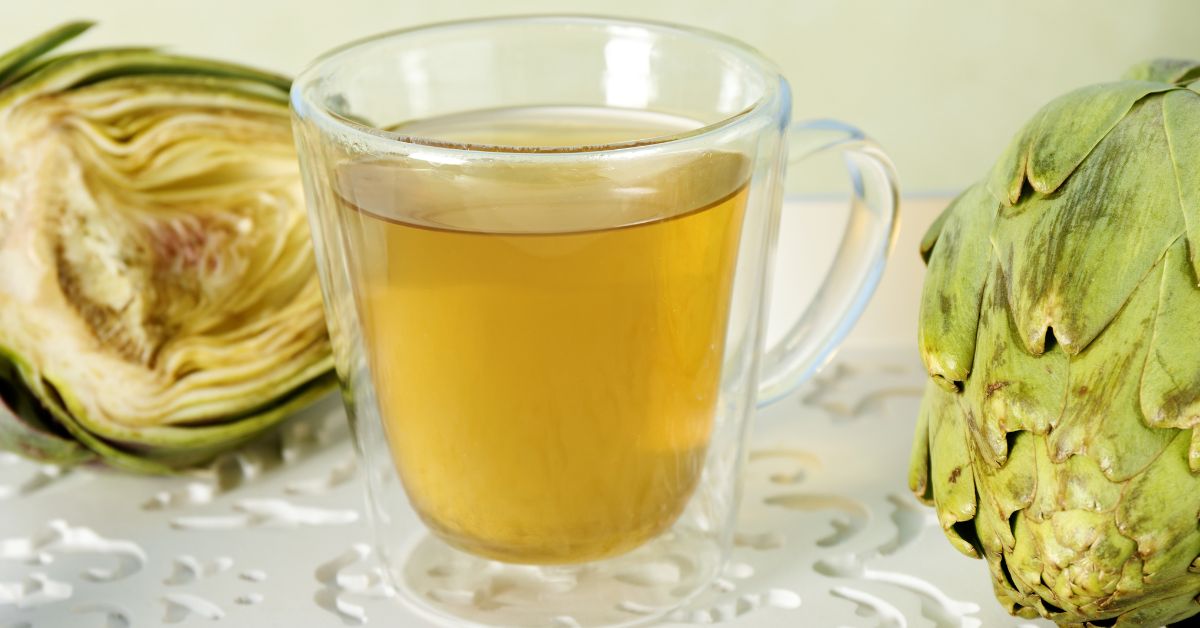
Potent Liver Support Blend
Ingredients:
- 1 teaspoon dried artichoke leaf
- ½ teaspoon dried dandelion root
- ½ teaspoon dried milk thistle seeds
- ½ teaspoon dried turmeric root
- ¼ teaspoon dried ginseng root
- 2 cups of water
Preparation:
- Combine herbs in a pot with cold water.
- Bring to a boil, then reduce heat and simmer for 20 minutes.
- Strain and drink one cup in the morning and evening.
Always consult a healthcare provider before starting any new herbal regimen, especially if you have existing health conditions or are taking medications. These blends are designed for general liver support and should not replace medical treatment for liver diseases.
☯️ Integrating Herbs into Daily Life for Liver Health
Incorporating herbs into your daily routine can significantly support liver health. Here are some practical tips for using herbs effectively and complementary practices to maximize their benefits.
Daily Use and Lifestyle Integration
- 🫖 Herbal Teas: Start your day with a cup of Gentle Liver Support Tea or Liver Cleanse Infusion. These teas can be part of a calming morning ritual that supports your liver health. You can also enjoy a cup of Hepatic Tonic Blend in the afternoon for an extra boost.
- 💚 Herbal Supplements: If you prefer not to drink herbal teas, consider taking herbs like milk thistle, dandelion root, or artichoke in capsule or tincture form. These can be easily integrated into your daily vitamin regimen.
- 🫚 Culinary Herbs: Incorporate liver-supporting herbs into your cooking. Add turmeric to soups and stews, use ginger in stir-fries, or sprinkle dandelion greens in salads. This approach enhances the flavor of your meals and provides continuous, gentle support for your liver.
Additional Practices to Support Liver Health
- 🥦 Dietary Adjustments: Incorporate foods that naturally support liver health, such as cruciferous vegetables (broccoli, cauliflower), leafy greens, garlic, and citrus fruits. These foods contain compounds that may help support the liver’s detoxification processes.
- 🫗 Hydration: Drinking adequate water throughout the day is crucial for liver health. Consider infusing your water with slices of lemon or a few sprigs of mint for added flavor and refreshment.
- 🏃♀️ Regular Exercise: Regular physical activity, such as brisk walking, swimming, or cycling, can help maintain a healthy weight and support overall liver function.
- 🧘♀️ Stress Management: Chronic stress can negatively impact liver health. Incorporate stress-reduction techniques such as deep breathing exercises, meditation, or yoga into your daily routine.
- 🍸 Alcohol Moderation: If you consume alcohol, do so in moderation. The liver processes alcohol, and excessive consumption may lead to liver damage over time.
- 😴 Sleep Hygiene: Adequate sleep is crucial for overall health, including liver function. Aim for 7-9 hours of quality sleep each night. Consider drinking a cup of Potent Liver Support Blend about an hour before bedtime for a soothing evening routine.
Integrating these herbs and practices into daily life can create a holistic approach to supporting liver health. Start with smaller doses of herbs to see how your body reacts, and it’s important to inform your healthcare provider about any new herbal regimens you’re considering.
🌱 Navigating Herbs Safely
Starting with small doses is the first step when adding herbal remedies to your health routine. This approach lets you see how you respond and adjust amounts for the best effect, keeping safety in mind. While many herbs are safe, everyone’s body reacts differently. If you notice any side effects, it’s important to stop and think about what might be causing them.
Remember, herbs can sometimes interact with prescription medicines. These interactions might make your medicines work too well or not well enough, which is why talking to a healthcare provider or an herbalist is essential. This is especially crucial if you’re pregnant, breastfeeding, taking medications regularly, or have an existing health condition. Getting advice tailored to your situation can help you avoid any unnecessary risks.
For kids and older adults, being extra careful with herbs is important. Their bodies might react more strongly to herbal remedies, and the chance of side effects or interactions could be greater. Before giving herbal treatments to children or elderly family members, getting advice from a professional is a must to ensure their safety.
By being cautious and seeking expert advice when needed, you can make herbal remedies a safe part of your wellness plan. This careful approach allows you to enjoy the benefits of herbs while keeping yourself and your family safe.
The liver plays a crucial role in detoxification, metabolism, and overall health. Milk thistle, turmeric, ginger, ginseng, burdock, dandelion root, and artichoke have unique properties that may benefit liver wellness. These herbs may protect liver cells, reduce inflammation, stimulate bile production, and support detoxification processes.
Drinking herbal teas, taking supplements, and using culinary herbs in cooking are easy ways to incorporate these herbs into daily life. Complementary practices like maintaining a healthy diet, staying hydrated, exercising regularly, managing stress, moderating alcohol intake, and getting adequate sleep help maximize the effects of herbs.
While these remedies show promise for liver support, more research is needed to confirm their effectiveness for specific liver conditions.
FAQ
What herbs are commonly used to support liver health?
Several herbs have been traditionally used to support liver health and function. Milk thistle (Silybum marianum) is perhaps the most well-known and studied herb for liver support. Its active compound, silymarin, has demonstrated hepatoprotective effects in various studies. Turmeric (Curcuma longa) is another popular herb, with its active compound curcumin showing anti-inflammatory and antioxidant properties that may benefit the liver. Dandelion root (Taraxacum officinale) is often used for its potential to stimulate bile production and support liver function. In some studies, Artichoke (Cynara scolymus) leaf extract has shown the potential to improve liver function. Other herbs that have been used for liver support include burdock (Arctium lappa), ginger (Zingiber officinale), and ginseng (Panax ginseng). While these herbs have traditional use and some scientific support, more research is needed to understand their effects and fully understand their optimal use for liver health.
How do these herbs potentially benefit the liver?
These herbs may benefit the liver through various mechanisms. Many of them, including milk thistle, turmeric, and ginger, have potent antioxidant properties that can help protect liver cells from damage caused by free radicals. This is particularly important as the liver is constantly exposed to toxins during its detoxification processes. Some herbs, like dandelion and artichoke, may stimulate bile production, which aids in digestion and supports the liver's natural detoxification processes. Certain herbs, such as milk thistle and turmeric, have shown anti-inflammatory properties, which can be beneficial as chronic inflammation is often a factor in liver diseases. Additionally, some evidence suggests that milk thistle may aid in the regeneration of liver cells, though more research is needed to confirm this effect. Ginseng has shown potential in reducing fat accumulation in the liver, which could benefit conditions like non-alcoholic fatty liver disease. However, it's crucial to remember that while these herbs show promise, more research is needed to understand their effects and fully understand their optimal use for liver health.
Are there any risks or side effects associated with using herbs for liver health?
While many herbs used for liver support are generally considered safe when used appropriately, there are potential risks and side effects to be aware of. Some people may experience allergic reactions to certain herbs. For example, individuals allergic to plants in the daisy family might react to dandelion or milk thistle. Digestive side effects such as mild diarrhea or stomach upset can occur with some herbs. Some herbs, like ginseng, may interact with medications or affect blood sugar levels, so they should be used with caution by people with diabetes or those on blood thinners. High doses of certain herbs may place additional stress on the liver, potentially causing more harm than good. It's also important to note that herbal supplements are not strictly regulated, so there can be concerns about quality and purity. Additionally, some herbs may be contraindicated in certain liver conditions, such as advanced liver disease or cirrhosis, where the liver’s ability to process substances is compromised. For these reasons, it's crucial to consult with a healthcare provider before starting any herbal regimen, especially if you have existing health conditions or are taking medications. They can provide guidance on potential interactions, appropriate dosages, and whether these herbs are suitable for your specific situation.

